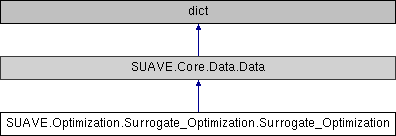
Public Member Functions | |
| def | __defaults__ (self) |
| def | build_surrogate (self) |
| def | iterative_optimization (self) |
 Public Member Functions inherited from SUAVE.Core.Data.Data Public Member Functions inherited from SUAVE.Core.Data.Data | |
| def | __getattribute__ (self, k) |
| def | __setattr__ (self, k, v) |
| def | __delattr__ (self, k) |
| def | __new__ (cls, *args, **kwarg) |
| def | typestring (self) |
| def | dataname (self) |
| def | __str__ (self, indent='') |
| def | __init__ (self, *args, **kwarg) |
| def | __iter__ (self) |
| def | itervalues (self) |
| def | values (self) |
| def | update (self, other) |
| def | append_or_update (self, other) |
| def | get_bases (self) |
| def | append (self, value, key=None) |
| def | deep_set (self, keys, val) |
| def | deep_get (self, keys) |
| def | pack_array (self, output='vector') |
| def | unpack_array (self, M) |
| def | do_recursive (self, method, other=None, default=None) |
Public Attributes | |
| sample_plan | |
| problem | |
| optimizer | |
| surrogate_model | |
| optimization_filename | |
| number_of_points | |
| max_iterations | |
Takes a SUAVE Optimization problem, builds a surrogate around it,
and iteratively finds the optimum of the surrogate, then samples at that point.
Stops when you hit max_iterations or it converges
Assumptions:
You're okay with represeting your problem with a surrogate
Source:
N/A
| def SUAVE.Optimization.Surrogate_Optimization.Surrogate_Optimization.__defaults__ | ( | self | ) |
This sets the default values.
Assumptions:
None
Source:
N/A
Inputs:
None
Outputs:
None
Properties Used:
None
Reimplemented from SUAVE.Core.Data.Data.
| def SUAVE.Optimization.Surrogate_Optimization.Surrogate_Optimization.build_surrogate | ( | self | ) |
Builds a surrogate for the problem
Assumptions:
None
Source:
N/A
Inputs:
None
Outputs:
None
Properties Used:
None
| def SUAVE.Optimization.Surrogate_Optimization.Surrogate_Optimization.iterative_optimization | ( | self | ) |
Optimizes iteratively
Assumptions:
None
Source:
N/A
Inputs:
None
Outputs:
output_real [float]
surrogate_problem [surrogate]
Properties Used:
None